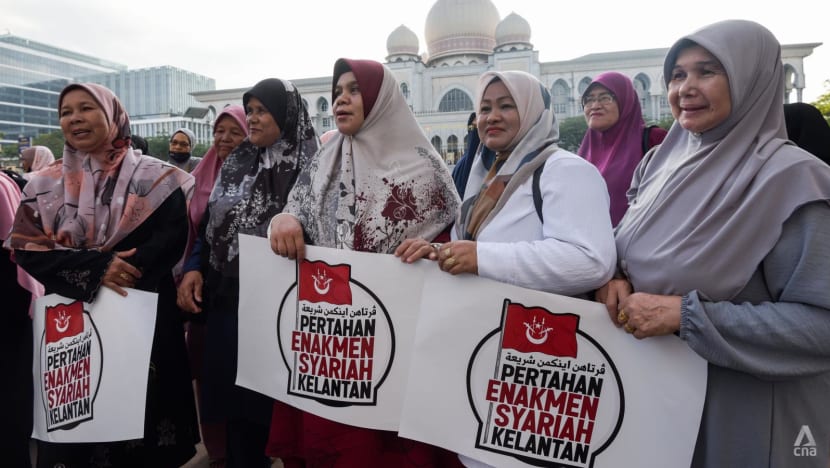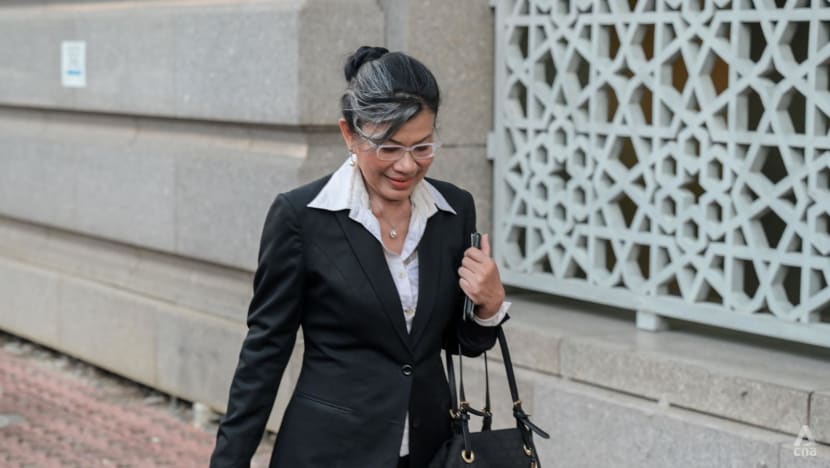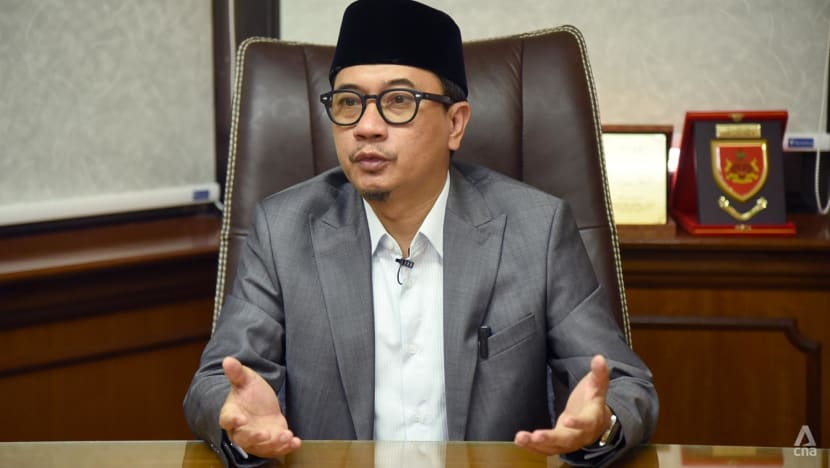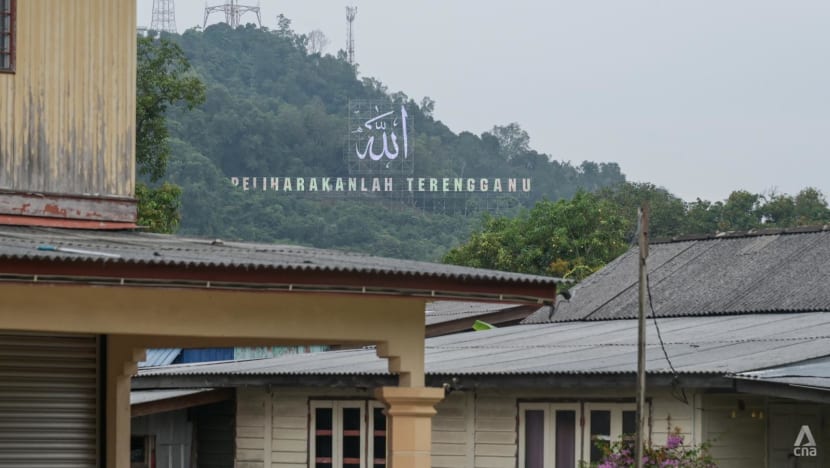https://www.channelnewsasia.com/asia/politics-islam-indonesia-malaysia-syariah-laws-4225126
Political Islam: Syariah-inspired laws in some parts of Malaysia, Indonesia worry non-Muslims
The latest instalment of a CNA five-part series on political Islam in Southeast Asia discusses how Syariah-inspired laws in Indonesia and Malaysia are being used as a tool to build party identity, and causing tension between Muslim and non-Muslim groups.

A man performing prayers inside a mosque in Kuala Terengganu. (Photo: CNA/Zamzahuri Abas)
This audio is generated by an AI tool.
KUALA LUMPUR/PADANG: Ms Hasyimah Ayuni has only recently taken an interest in Islam outside the mosque.
The youngest of seven siblings, Ms Hasyimah, who is pursuing a masters degree in environmental health at a university in Malaysia’s Klang Valley, now believes that it is her duty to live in accordance with Islamic principles.
This came about following a court case that challenged the validity of several Syariah laws in the eastern state of Kelantan in February.
Ms Hasyimah told CNA that as Malaysia has a Muslim majority, it was logical that laws for Muslims be given priority over other laws.
She also wants Malaysia to use Syariah laws instead of the common law system being used today.
“As a Muslim, you have laws in your religion that God told you to follow but your country asks you to follow (their) laws, some which are based on Western sources (and) differ from your religion. Wouldn’t you feel angry and sad?” she said, adding that Islam covers all aspects of life.
She believes Syariah laws are the best set of laws that would guarantee the wellbeing of both Muslims and non-Muslims alike.
“This is because the laws are based on legal sources for Muslims such as the Quran (Islam’s holy book),” she said.
According to a study by the Pew Research Center in 2022, most Muslims in both Malaysia and neighbouring Indonesia favoured making Syariah the official law of the land.
The results of the study, which were released in September last year, said that 86 per cent of Malaysian Muslims supported using Syariah as the official law of the land, while 64 per cent of Indonesian Muslims supported the idea.
But communities in the two countries are debating whether these regulations should apply to all, or if Islam’s influence could impact diversity and social freedoms.
According to the Pew Research Center, Syariah, or Islamic law, offers moral and legal guidance for nearly all aspects of life – from marriage and divorce, to inheritance and contracts, to criminal punishments.
About 63.5 per cent of Malaysians are Muslims, according to official statistics.
Political analyst Azmi Hassan of the Nusantara Strategic Academy said most Muslims in Malaysia would say that Syariah law should be used to govern them, and this was regardless of where they come from or their status.
“The belief is there in general. Syariah laws are considered to be the ultimate in governance and Muslims believe them to be the best laws compared to whatever other laws that are being practised,” he said.

‘BLACK FRIDAY’: PROTESTS AGAINST COURT DECISION CHALLENGING SYARIAH LAWS
The issue of Syariah law recently made headline news in Malaysia after the country's top court declared on Feb 9 that more than a dozen Islamic laws enacted by the state of Kelantan were unconstitutional, following a 2022 challenge by lawyer Nik Elin Zurina Nik Abdul Rashid and her daughter Tengku Yasmin Nastasha Tengku Abdul Rahman.
A nine-member Federal Court bench, in an 8-1 decision, declared 16 laws in Kelantan's Syariah criminal code "void and invalid", including provisions criminalising sodomy, incest, gambling, sexual harassment, and desecrating places of worship.
Malaysia has a dual-track legal system with Islamic criminal and family laws applicable to Muslims running alongside secular laws. Islamic laws are enacted by state legislatures while secular laws are passed by Malaysia's parliament.
Chief Justice Tengku Maimun Tuan Mat who delivered the majority judgement said that the Kelantan state had no power to enact the laws, as the subject matter was covered under parliament's law-making powers.
There are altogether 68 sections in the Kelantan Syariah criminal code, out of which 52 sections are still considered to be constitutional.
The decision sparked uproar among some conservative Muslim groups, who claimed that the challenge would undermine Islam or the Syariah courts in Malaysia.

The Islamist party Parti Se-Islam Malaysia (PAS) led the loudest protests against the court decision, claiming that it was a “Black Friday” for the country.
PAS has ruled Kelantan since 1990.
“When one Syariah law in one state is cancelled, it also affects the same laws in other states, 14 more states are in a very dangerous and critical situation.
“This is not a small matter, defending Syariah means defending the institution of the King who is the head of the State’s Islamic Religion,” PAS secretary-general Takiyuddin Hassan was quoted as saying by the Malay Mail on Feb 9.
In an interview with CNA, PAS working committee member Muhammad Khalil Abdul Hadi said the party's efforts to empower Syariah in Malaysia have been consistent since its formation in the 1950s.
“It’s not about politics but about principles. It’s not just an issue for PAS members, but an issue for all Muslims based on the principles of our country. In the Federal Constitution, rights are given to Islam in many aspects, such as Syariah, marriage, and education.
“It’s not at the level we want now but we will always work hard to empower it and we will fight anyone who wishes to sideline it,” said Dr Muhammad Khalil, who is also the eldest son of PAS president Abdul Hadi Awang.

PART OF POLITICAL GAMES: ANALYSTS
Professor James Chin, director of the Asia Institute at the University of Tasmania, said that PAS' doubling down on the Syariah laws in Kelantan was part of the party’s political game, showing the people that they stood for Islamic supremacy.
He said the party knew it couldn’t pass any laws that contravened the Federal Constitution and that it needed the support of the royalty to make it a reality.
“In a way, PAS is just playing a game of reinforcing their brand at the end of the day. They know that you know they cannot win because they cannot override the Federal Constitution.
“Secondly, a lot of these things actually require the support of the Sultans in order to make it a reality. To me, it's all about games rather than reality,” he said.
He, however, added that the subject scared a lot of the middle class in Malaysia, especially the non-Muslims, because many of them did not understand how the system works.
Senior Fellow and Coordinator at the Regional Social and Cultural Studies Programme, ISEAS-Yusof Ishak Institute, Norshahril Saat, said that PAS had to be consistent to build on its support base, and it was using identity politics to do so.
“In order to retain its support base, it has to paint the picture that the current government is not doing enough to protect Syariah laws and this has been consistent with PAS’ struggle in the past,” he said.
“I think Malaysians have to agree that the recent Nik Elin case is testimony that there are certain boundaries which PAS cannot cross and that is really cemented in the country's fabric,” he added.
Related:
ONLY FOR MUSLIMS, BUT FOR HOW LONG?
A Syariah lawyer in Kelantan, Alawi Abdul Rashid of Alawi & Associates, said the laws only applied to Muslims, including for offences such as adultery, alcohol consumption, and not fasting during the month of Ramadan.
“I think non-Muslims understand this but this topic is always politicised,” he said.
PAS information chief Ahmad Fadhli Shaari said other parties besides PAS were also speaking about strengthening these laws and that the Syariah Courts had fewer powers compared to the civil courts.
“This is to do with the way of living of Muslims,” he said, adding that non-Muslims did not need to worry about Syariah laws as they would not be impacted by it.
He also said that generally, PAS didn’t need to use other countries as a reference when it came to administration.
“We don’t use Afghanistan as a reference. No. Do we want to use Saudi as a reference? No. Pakistan as a reference? No. If PAS became the government, which country would be the reference? We will use Malaysia as our reference.
“We are a multiracial country. We have Chinese, Indians, non-Muslims and others. This is our uniqueness that others don’t have ... They have their own ways, in accordance to their own ways. We have our own ways,” he said.

A Kelantanese non-Muslim who wanted to be known only as Mr Tiong, 35, said he was worried that Syariah laws could one day also apply to those not of the faith.
Mr Tiong, who is from the town of Bachok, said his main concern would be the harsher Hudud laws, which can include amputation of hands for theft and stoning for adultery, among other things.
“I know that they are meant for Muslims, but there is always a fear it could be used against non-Muslims,” he said.
Mr Ismail Yahya, the former Terengganu chief Syariah judge, said while many Muslims in Malaysia support wider implementation of Syariah law, it wasn’t realistic in the Malaysian context of diversity of faiths and multiculturalism.
“People want all sorts of things, but their wants are not realistic with our situation. There is still a lack of knowledge and understanding about the laws,” he said, adding that the issue of Syariah law was being politicised.
Mr Ismail, who was also the former mufti (Muslim legal expert) for the state, said the Syariah courts were important for matters pertaining to family law such as marriage and divorce for Muslims as well as inheritance matters.
‘DECLINE OF DEMOCRACY’: ANALYST
Meanwhile in Indonesia, life as a religious minority is becoming increasingly hard in parts of the country which have enacted Syariah-inspired regulations and decrees.
These bylaws range from mandating women and girls wear the hijab in public schools and government institutions, to requiring students be able to read the Quran if they wish to graduate. They have not only discriminated against religious minority groups but also emboldened the Muslim majority to become less tolerant towards people of other faiths, according to some religious leaders.

In West Sumatra – where 97 per cent of the 5.5 million population are Muslims – Christians, Catholics, Buddhists and Hindus find it extremely hard to build so much as an extension to their churches and temples, let alone a new house of worship from the ground up, without attracting a wave of protests and condemnation from the local Muslim population.
According to the Indonesian Bureau of Statistics, there were 12,198 mosques and Islamic prayer houses across West Sumatra in 2021. That same year, there were only 404 churches and chapels in the province.
Minority religious groups in mainland West Sumatra said they tried to apply for permits from the local government to build their respective houses of worship but it cited rejection from the local population as the reason for not issuing the permits.
This is why there are only a handful of churches and temples in West Sumatra, most of them built before Indonesia gained independence from the Dutch in 1945. In most towns in the province, the only houses of worship are mosques.
“We just want a safe place for us to pray and stage religious activities. We have lived (in West Sumatra) for decades. We have considered (West Sumatra) our home,” a Christian congregation leader in one West Sumatra town told CNA. The deaconess asked not to be identified out of fear of harassment.
For years the congregation were unable to obtain a permit to build their own church and the locals were also reluctant to sell their land or rent their properties, if they knew that a church would be built there.
The congregation has to hold Sunday services at a local military base and stage Bible study sessions at a one-storey shop on a dead-end alleyway in the quiet part of town.

They live in constant fear that local Muslim groups might come in one day and disband their religious gatherings, as has been the case in other parts of Indonesia.
In August last year, a Bible study session in the provincial capital Padang was met with threats of violence. In 2019, Christian congregations in two West Sumatra regencies had to call off their Christmas celebrations because of rejection from local Muslim groups.
Even the dead cannot escape the wave of discrimination as Christians, Buddhists and Hindus are told that local cemeteries are for Muslims only.
“If we want to bury the dead, we have to take the body out of the province. For those of us who still have relatives elsewhere, they can make arrangements for the burial process. But those without a relative? Those without money to transport the body?” said David, a Christian living in West Sumatra who wanted to be known by only his first name.
Human Rights Watch’s Indonesia researcher Andreas Harsono said the presence of Syariah-inspired bylaws “has paved the way (for) the decline of democracy, civil liberties and many other rights in these Muslim-majority areas”.

The New York-based rights group recorded more than 700 Syariah -inspired regulations and decrees across Southeast Asia’s biggest economy.
These regulations are rampant in homogeneous provinces like West Sumatra and Aceh, where almost all of the population is Muslim. The areas are also former strongholds of Darul Islam, Islamist rebels who sought to secede from Indonesia and establish their own Islamic states in the 1950s, such as West Java and South Sulawesi.
And activists are worried that people in West Sumatra will become even more intolerant after the national parliament in Jakarta enacted a law on West Sumatra in 2022 which recognises Syariah as the basis for the province’s traditions and culture.
“Freedom of expression and freedom of religion are already declining in West Sumatra,” said Mr Bonar Tigor Naipospos of the not-for-profit group Setara Institute for Peace and Democracy.
The 2022 law, he said, will embolden hardline Islamists to further harass people of other faiths and put pressure on local leaders to issue more discriminatory regulations and policies which favour the Muslim majority.
“The legal basis (for discrimination) is now stronger,” Mr Bonar said.

A GOOD POLITICAL MOVE
The 1998 fall of former president Suharto, who ruled the country with an iron fist for more than three decades, provided the impetus for Indonesia to decentralise power and provide autonomy to cities, regencies and provinces to enact their own regulations as long as they do not run afoul of national laws.
The fall of Suharto also gave rise to the presence of Islamic hardline groups such as the Islamic Reform Movement (Garis), the Islamic People’s Forum (FUI) and the now-disbanded Islamic Defenders Front (FPI), which were suppressed and could not express their political views under Suharto’s rule, when extreme religious views and the slightest signs of friction were not tolerated.
“In order to maintain power and rally widespread support, (local leaders) tried to accommodate the demands of these Islamic groups. So sometimes (these regulations) were not issued for ideological reasons but for political pragmatism,” Mr Bonar of Setara said.
The Solok regent responsible for introducing two of Indonesia’s first Syariah-inspired regulations, Mr Gamawan Fauzi, went on to become West Sumatra governor in 2005 and the country’s Minister for Home Affairs in 2009.
Those who oppose these Syariah-inspired regulations have faced political backlash.
In November 2018, Mr Gusrizal Gazahar, then-chairman of the West Sumatra chapter of the Indonesia Ulama Council (MUI), the country’s most influential Islamic organisation, issued a fatwa, or edict, barring Muslims from voting for parties and politicians who criticise the implementation of Syariah in the province.
Mr Gusrizal was responding to statements made by then-chairwoman of the Indonesian Solidarity Party (PSI) Grace Natalie Louisa a few days before, saying that her party “will never support Syariah-based or Bible-based regulations.”

Mdm Grace’s remarks were met with protests in several provinces across Indonesia, where 87.2 per cent of the country’s 270 million population is Muslim. Local clerics and politicians demanded the former PSI chairwoman issue an apology.
Mdm Grace later said that her remarks were meant as a criticism of regulations which are discriminatory in nature instead of a blanket condemnation of all religious-based legislation.
The following year, PSI received 1.14 per cent of the votes in West Sumatra at the legislative election, the third-lowest out of the 16 political parties contesting the polls. This year, PSI fared even worse, receiving just 11,700 or 0.4 per cent of the 2.9 million votes cast in the province.
STRONGER LEGAL BASIS
The Home Affairs Ministry is tasked with reviewing all regulations issued by provinces, regencies and cities across Indonesia. So far, the ministry has refused to repeal these Syariah-inspired legislations, arguing that they are in line with the national law and were enacted through democratic processes at their respective local legislatures.
But there are provinces such as Aceh which have made it compulsory for all legislative candidates to be able to read the Quran – which is written in Arabic – making it virtually impossible for non-Muslims to have one of their own represented in local parliaments or city councils.
Aceh is the only province where violations of the Syariah are prosecuted criminally and penalised with public flogging. It is the only province which has its own Syariah police and court system.

In West Sumatra, the legal basis for these Syariah-based regulations has grown stronger with the introduction of the 2022 Law on West Sumatra.
“The West Sumatra law creates legitimacy for Syariah-inspired regulations to be maintained and (is) difficult to be undone,” Mr Andreas of Human Rights Watch said.
The law recognises the philosophy, “adat basandi syarak, syarak basandi Kitabullah” (tradition based on the Syariah, Syariah based on God’s Law) – observed by West Sumatra’s biggest ethnic group, Minangkabau – as the province’s values and characteristics.
Although able to appease both the Islamic puritans and Minangkabau traditionalists of West Sumatra, the philosophy was panned by critics for failing to accommodate the values of non-Muslims, migrants as well as the people of Mentawai, a Christian-majority chain of islands which borders the Indian Ocean but is administratively part of West Sumatra.

Mr Herdi Siswan, a politician and a member of the Minangkabau customary council promised that the government and the legislature will protect the interests of religious minorities.
“The government and the legislature are voted (in) not just by Muslims so it is impossible that we won’t fight for (non-Muslims). The few shall not be oppressed by the many. That is not the way of the Minangkabau people,” he said.
But Mr Herdi admitted it is hard for non-Muslims in West Sumatra to secure permits to build their houses of worship and that some schools force pupils to wear the hijab, regardless of their faith.
“These are the rules that people here have observed for years. There is nothing wrong with the government trying to regulate their people according to the Syariah,” he said.
Additional reporting by Amir Yusof





Comments
Post a Comment